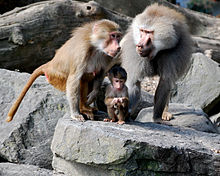

Baboons are African and Arabian Old World monkeys belonging to the genus Papio, part of the subfamily Cercopithecinae. The five species are some of the largest non-hominoid members of the primate order; only the mandrill and the drill are larger.
Quotes
- There once was a brainy baboon,
Who always breathed down a bassoon,
For he said, "It appears
That in billions of years
I shall certainly hit on a tune".- Arthur Stanley Eddington, New Pathways in Science (1939).
- Evolution is a process that never stops. Baboons who fail to exhibit moral behavior do not survive; they wind up as meat for leopards.
- Robert A. Heinlein, Expanded Universe, (1980), "The Pragmatics of Patriotism," (1973), address to the U.S. Naval Academy.
- When I first began working with baboons, my main problem was learning to keep up with them while remaining alert to poisonous snakes, irascible buffalo, aggressive bees, and leg-breaking pig holes. Fortunately, these challenges eased over time, mainly because I was traveling in the company of expert guides—baboons who could spot a predator a mile away and seemed to possess a sixth sense for the proximity of snakes. Abandoning myself to their far superior knowledge, I moved as a humble disciple, learning from masters about being an African anthropoid. Thus I became (or, rather, regained my ancestral right to be) an animal, moving instinctively through a world that felt (because it was) like my ancient home.
- Barbara Smuts, Reflections, in The Lives of Animals (Princeton University Press, 1999), p. 109.
- There were 140 baboons in the troop, and I came to know every one as a highly distinctive individual. Each one had a particular gait, which allowed me to know who was who, even from great distances when I couldn't see anyone's face. Every baboon had a characteristic voice and unique things to say with it; each had a face like no other, favorite foods, favorite friends, favorite bad habits.
- Barbara Smuts, Reflections, in The Lives of Animals (Princeton University Press, 1999), p. 111.
- The strain of man's bred out
Into baboons and monkey.
See also
External links
Wikiwand - on
Seamless Wikipedia browsing. On steroids.
